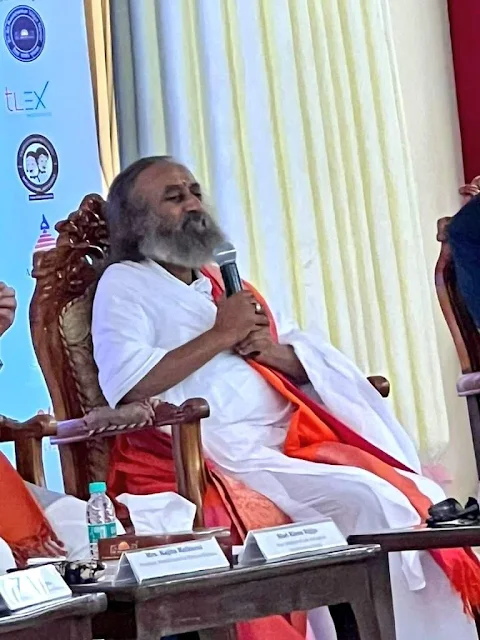Look at happiness and misery as though it is happening outside of you. Remind yourself again and again that they are happening outside your mind.
Chapter 14 - Offering To Shiva
Day 67
The river of life is not always flowing evenly. Sometimes it crashes like a waterfall and after hitting the rocks, it rises back up. It courses in between boulders and sometimes runs so softly that we hardly feel it
move.
Until it reaches the sea, the river's currents and movements take different forms. Similarly, it is difficult to say what will happen in life and when. Life is just like a river.
As long as it flows, it is shivamaya, filled with Shiva, and if it stops somewhere, it starts to stagnate. On certain occasions we float oil lamps on the river's surface or offer flowers to the water.
Some people throw in garbage or planks of wood. The water carries anything you throw in it and moves ahead. Our lives should flow in a similar manner. This is the core of the Shiva Sutras.
Now we are coming to the end of the Shiva Sutras. Let us look at the last sutra. "See happiness or misery in your life as though it is taking place outside you." This is an advantage of meditation.
Suppose your mind is experiencing some pleasure or it is sad, can you look at it as though all this is happening somewhere else or being shown on a screen?
When people in villages watch movies and their favorite actor comes on screen, they laugh when he laughs, and they cry when he cries.
When a viewer is engrossed in a scene, then he experiences happiness and sadness, but if you observe with the awareness that I am only watching a movie, the happenings in the movie will not affect your consciousness.
Look at happiness and misery as though it is happening outside of you. Remind yourself again and again that they are happening outside your mind.
Even great people experience misery. After having compiled the four Vedas, the eighteen Puranas and the Bhagavathah, the great sage Vyasa wept inconsolably when his son left him and went away.
There is nobody more knowledgeable than Vyasa. If Vyasa had not been born, today we would know nothing about Krishna, the Puranas, or the Vedas.
This one sage, Vasa, laid the foundation of India's culture and is responsible for the Mahabharata, works on the Vedas and other books. That is why when people take the stage to speak, it is called vyasapitha.
Even such a sage fell into deep sadness. He called everyone, saying, "Come, take from this knowledge. With this knowledge of Brahman, you will find everything, righteousness, wealth, fulfillment of desires
and freedom.
I am offering knowledge that will give you happiness in this world." Even when he called, please come," nobody came. He wept, thinking, "What can I do? Whatever work I have done until now, is it all useless?
Similarly, when Christ was crucified, he cried, "My God, why have you forsaken me?" But there is a vast difference between that cry and a cry in the mind of an ordinary person.
Suppose you are looking at your reflection in a lake's smooth surface, you can see yourself clearly. If you throw a stone, it shatters the reflection. Now if you start crying that your image shattered and thinking, "I am gone," then that
crying is out of ignorance.
There is a story about Mullah Nasruddin. He was under the delusion that he was dead. Many people spoke to him, but he kept insisting that he was dead. Everyone got tired of telling him, "No sir, you are alive and talking."
He would reply, "No, no. Even corpses can talk." His family took him to see a psychiatrist. He said, "See, I am dead, but nobody believes me. You at least can convince them that I am dead."
The psychiatrist tried several arguments with him, saying, "No sir, you are alive. You have walked here, you are sitting and eating." No sooner would he say these things than Mullah would reply, "No, I am dead."
The doctor thought for a moment and took out a blade. He made a small cut on Mullah's hand, which immediately started bleeding.
The doctor said, "See, you are bleeding. Do dead bodies bleed? No, but there is blood on your hand, so you are alive. Aren't your arguments wrong?" Mullah said, "Today I realised a great truth."
The psychiatrist was happy, thinking, "My God, his disease is cured, he has realised the truth that he is alive. Mullah continued, "Yes, I realised a great truth. Do you know what it is? A dead body also bleeds."
Similarly, when we have foolishness in our heads, no matter how many discourses you hear or whatever you do, it is of no use. Ignorance should be gotten rid of naturally, with an innocent mind.
In an ancient scripture, the results that come from studying it are given at the very beginning. The body will shine. A bright consciousness inhabits the body.
It is initially in the form of desires and habits. Then, these desires transform into love, and love transforms into pure consciousness.






















Comments
Post a Comment